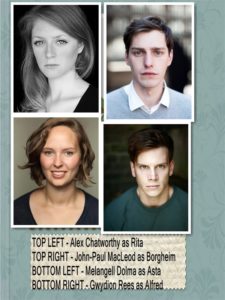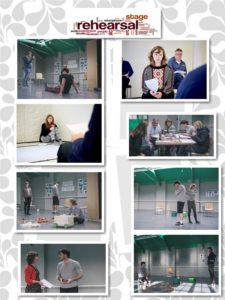Little Wolf is a revision of a comparatively rarely performed 1894 play Little Eyolf by Norwegian playwright Henrik Ibsen. LUCID’s new production tours venues in South Wales in late October and November 2017 and promises to be a worthwhile enterprise.
It has been given a contemporary revision, by LUCID’s award-winning director Simon Harris.
PLOT OF LITTLE WOLF FROM LITTLE EYOLF BY IBSEN
The action is set over a period of thirty-six hours at the home of Alfred and Rita Allmers. Alfred is an occasional teacher, intellectual and landowner. Their home is located near a fjord and some distance from the nearest town, thereby emphasising Ibsen’s naturalistic style of people influenced largely by the environment they live in. Their isolation from the remainder of the community also extends to their own marital relationship, which is on a steep downward curve due to the event that had caused their nine-year old son Eyolf to be partly paralysed. The boy’s handicap having been due to him falling off a table in babyhood, where he had been left whilst his parent’s engaged in making love. The feeling of guilt over this accident provides the backdrop to the events that ensue.
THE PRODUCTION
LUCID was formed in 2012 by Simon Harris and its aims are:
- To act as a catalyst and resource for artist development
- to be a producer of innovative and distinctive theatre projects
Simon has an impressive C.V. having been associated with the National Theatre and the Soho Theatre Company as well as Artistic Director of Script Cymru the national company for new writing in Wales. In 2009, Simon won a highly-prized Creative Wales Award to enable him to develop new and innovative theatre projects.
INTERVIEW
I interviewed Simon about Little Wolf.
RB: Little Wolf is a comparatively rarely performed Ibsen classic. Why do you think that is?
SH: Well, Little Wolf is my version of the Ibsen classic Little Eyolf, and A Doll’s House, Hedda Gabler, Peer Gynt , these are the really well known plays, and Little Wolf comparatively, certainly in Wales, (I’m not aware of any productions in Wales to be honest), but comparatively in the UK, it is less performed. The peculiar thing is that when I speak to people who know the play, – I bumped into a couple of people in London, friends of mine who are directors a couple of weeks ago, and they said, “What are you doing?” and I said that I was doing this play based on Little Eyolf and they all went, “I love Little Eyolf!”, so I think part of it is that it is a challenging play in its content for some people, but it’s also an incredibly beautiful play –
RB: Yes, it’s a very intense play, I presume there is no interval, do you think the audience is emotionally able to cope with that, because it is a very demanding play on the emotions isn’t it?
SH: Well I think audiences these days are up for emotional engagement. If you look at the kind of television that people are tuning into these days, they’re sucking up the box sets, they really love the kind of deep engagement with characters they really get, and I think that this is the kind of offer that this play makes, it kinds of opens up its soul and lets you in a really profound and beautiful way. I think that this is a time when people are looking for an opportunity to empathaise and reflect a bit more, and if you compare with what is going on in the world at this moment, you know there are a lot of extremes in the world at this moment, and this is a play about the nuances of human behaviour and our ability to work through adversity towards a more hopeful position, so I think that aspect of the play that people should welcome.
RB: Going on from that, I know that the Little Eyolf play has an open ending, slightly optimistic, but it’s an ending that in 1894 when the play was written, but do you think it works well today, because the Allmers were landowners, quite wealthy people that would devote their wealth to the poor, what with a Social Security system which does that today? Do you think that translates well today, or have you done something different with it?
SH: Yes, I have done something different with it, so my connection with the play goes back a long time. I happened to see a version of it on the BBC, it’s a lovely production and I didn’t know the play at all, I didn’t know about Ibsen, but as soon as I landed on the channel that it was on, I was hooked, I was deeply deeply hooked into it and it made a lasting impression on me, so when I came to thinking about working on a new piece, I thought I would have a look at that, and when I read it I was quite surprised to see how different it was from the memory that I have of it. There were still things that were incredibly powerful and I thought very urgent and relevant, and some aspects of the play that felt very awkward to me – something that a modern audience wouldn’t identify with, so that’s why I felt that it was very important to do a different version of it, rather than a modern day version of an old play.
RB: Little Eyolf is always a play that has divided critics. I know the Ibsenist Michael Meyer regarded it as his favourite Ibsen play, and there are others who rate this at the top of the tree… Now I understand that your working is set in the contemporary day and is set in Norway?
SH: Yes.
RB: Did you consider moving the setting to Wales for example. Would it work?
SH: There is something similar about the non-conformist culture. Ibsen was fascinated about how we live, and the sometimes self-deluding behaviours that we have and hypocrisies that we have, so I think that may resonate fairly strongly for a Wales with a Non-Conformist chapel tradition. I didn’t really feel that gain that much from the setting of it in Wales. I’ve seen that done a few times, but I think it shows up some tensions in the production, and I always thought the best thing to do with it, and I’ve talked about this in one of the little films we’ve done on this on Facebook, is that we feel that we have absorbed the Norwegian culture aspect, but it’s not in your face, it’s not very overt,.
RB: I want to ask a question about Rita. She has been described as a monster, and one of the reasons why I like Ibsen is that he writes about very strong-willed heroines, I’m thinking about Svanhild in Love’s Comedy, Nora of course in A Doll’s House. How do you compare Rita to these heroines? Are you sympathetic to Rita, is she, in fact a heroine?
SH: I’m deeply sympathetic to her. I think that’s a very Victorian judgmental attitude to Rita to call her a monster. I think what is so difficult for people is that she is in a relationship with a man who is withdrawn from her, (and perhaps it’s a little more explicit in this play compared to the original), blames her conclusively for the past incidence that informs the whole of the play. Our version explores that much more comprehensively, and I think she is magnificent. She’s resilient, she’s loyal, she’s intelligent, she’s witty, she’s driven and the main thing is that she has a foundation in the love the two characters had for each other. She holds on to that. She knows what that meant in the past, and is the one who insists on it repeatedly in the play. That makes her strong. I think there’s an incredible resilience in her and it’s a beautiful journey in a way in that it moves from adversity to a new honesty and ability to move forward.
RB: Finally, I would like to ask about LUCID. Perhaps you could tell us something about the Company?
SH: This is the first theatre production of the company. We’ve been doing a variety of different works, some of it behind the scenes, working upon developing people, artists’ development, leadership development work, but I also had a piece by Chekhov that I developed as well, when I did a contemporised version of an early Chekhov play that I was interested in, so that might be something for the future. It’s early days for the company. The thing that interests me at the moment is the value of old stories. I’m slightly concerned that in the rush towards a more experiential theatre presentation. that we might lose touch with some of the dramatic traditions as well, but it doesn’t mean to say that because you interested in the dramatic tradition that it’s necessarily old-fashioned or out of date or anything else. The tradition goes back two thousand years, and I’m worried sometimes that we might be throwing the baby out with the bath water. I believe in a very pluralistic theatre culture, this work is about re-framing old stories in new urgent relevant ways. Hopefully in a way that audiences will appreciate and engage with.
RB: And presumably with the title of your company in mind, lucidity is something that you empathise in the delivery?
SH: Well I’d love that. That’s what we aim for. The LUCID name came about because I set the company up when what I considered was a lack of dialogue around what was happening in theatre, and I wanted to get people talking and thinking about some of these issues , so it was a kind of hint towards a hope for greater clarity.
RB: Thanks for your time.
Little Wolf is a rare opportunity to see a reworking of a great Ibsen play. The contemporary setting should resonate with the trials and tribulations that many of us go through in our daily life today. Ibsen was a very forward-thinking playwright for his time and his themes are as powerful today as they were when written one hundred and twenty years ago.
This promises to be an exciting production and I would urge you view it as it goes on tour around South Wales. The dates are as follows:
CARDIFF:
Chapter 20, 21, 23 – 28 October at 7.30
https://www.chapter.org/little-wolf
Post-show talk after the performance of the 23rd
SWANSEA:
Volcano Theatre 1-4, and 7-11 November at 7.30
http://www.volcanotheatre.co.uk/whats-on/little-wolf
BRECON
Theatr Brycheiniog 16 November at 7.30 and 17 November at 2
https://theatrbrycheiniog.ticketsolve.com/shows/873578721?locale=en-GB
NEWPORT
The Riverfront 22 November at 7.45
https://tickets.newportlive.co.uk/en-GB/shows/little%20wolf/info
Suitability: 14+
Duration: 90 mins (no interval)
BACKGROUND MATERIAL
Little Wolf is a vital, intense and blisteringly funny retelling of Ibsen's Little Eyolf.
Touring Wales this Autumn!@Arts_Wales_ pic.twitter.com/WqByKDZnTU— Lucid (@lucidtheatreco) September 12, 2017
https://www.youtube.com/watch?v=yZmGDzDKzWI
https://www.youtube.com/watch?v=SbOodTNGP24
https://en.wikipedia.org/wiki/Little_Eyolf
https://lucidevent.wordpress.com/about/



